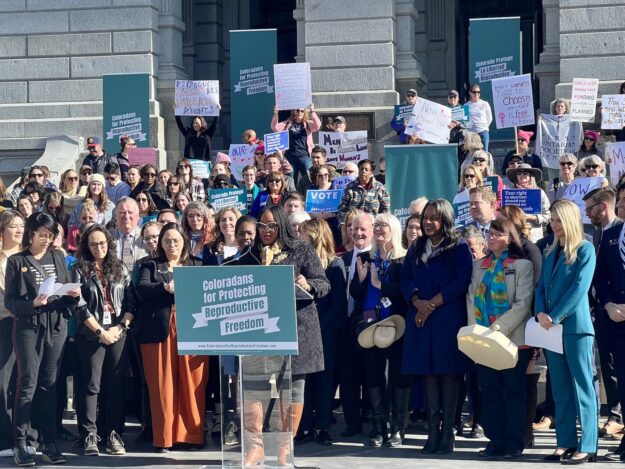Widgetized Section
Go to Admin » Appearance » Widgets » and move Gabfire Widget: Social into that MastheadOverlay zone
Hickenlooper, Bennet lead charge to codify right to contraception as Republicans balk

Bianka Emerson, the president of Colorado Black Women for Political Action, speaks during the campaign kickoff event for Initiative 89 at the Colorado Capitol in Denver on January 22, 2024 (Sara Wilson/Colorado Newsline).
Republicans in the U.S. Senate voted against a measure to codify and strengthen the legal right to contraceptives at the federal level on Wednesday. The Right to Contraception Act, introduced last summer, was sponsored by Sen. Michael Bennet (D-CO), Sen. John Hickenlooper (D-CO), and others.
“In an America where women are being forced to carry pregnancies to term that could seriously endanger their lives, birth control is life or death,” said Hickenlooper in a news release. “Republicans just voted to limit women’s freedom.”
Sen. Bill Cassidy (R-LA) ranking member of the Senate Health, Education, Labor, and Pensions (HELP) Committee, argued that the bill was motivated by the upcoming election, where Republican opposition to abortion has proven unpopular among voters.
“The Democrats are using their power to push an alarmist and false narrative that there is a problem accessing contraception,” said Cassidy in a news release. “There is no state or territory that bans access to birth control. Democrats know this, but misleading and scaring voters seems to be the only means they think they have to get voters to support them this election … This is a political stunt designed to fearmonger and mislead the public in an attempt to sway voters in an election year. Republicans should not play along.”
Last year, voters in Ohio passed a ballot initiative, Issue 1, that enshrined reproductive rights in the Ohio Constitution — contraception, fertility treatment, abortion, and miscarriage care — restoring Roe v. Wade-era access in Ohio and protecting “the right to abortion up to the point of fetal viability.” Former President Donald Trump carried Ohio with 53% of the vote in 2020, but 56.6% of voters supported Issue 1. Ohio joined California, Michigan, and Vermont in amending their state constitutions to protect abortion, and this has anti-abortion activists concerned.
This year Colorado voters will decide on Proposition 89, the ballot initiative that would enshrine abortion access in Colorado’s Constitution.
Since the Supreme Court’s Dobbs v. Jackson Women’s Health Organization decision, which overturned Roe v. Wade, a number of states have passed legislation to ban or restrict access to abortion, and four states — Arkansas, Mississippi, Missouri, and Texas — have moved to limit access to contraceptives.
The Right to Contraception Act cited Supreme Court Justice Clarence Thomas’ concurring opinion in Dobbs, noting, “Justice Thomas, in his concurring opinion in Dobbs v. Jackson Women’s Health Organization, stated that the Supreme Court ‘should reconsider all of this Court’s substantive due process precedents, including Griswold, Lawrence, and Obergefell’ and that the Court has ‘a duty to correct the error established in those precedents’ by overruling them.”
The Right to Contraception Act would have removed the already-existing state restrictions. Specifically, the bill would have guaranteed the legal right for individuals to get and use contraception and for healthcare providers to offer contraceptives, contraception, and information, referrals, and services related to contraception. It would also prohibit the federal government or any state from administering, implementing, or enforcing any law, rule, regulation, standard, or other provision that would prohibit or restrict the sale, provision, or use of contraception, and allow the Department of Justice, providers, and individuals harmed by restrictions on contraception access made unlawful under the legislation, to go to court to enforce these rights.
The Right to Contraception Act was also introduced and passed the House in 2022, but failed to advance in the Senate. Conservatives argued that the act was a violation of the First Amendment.
While much of the focus of anti-abortion activists is on the act of abortion itself, many activists, such as those in the abortion abolition movement, oppose the use of hormonal birth control over claims that it is an abortifacient.
Others oppose birth control due to firmly held religious beliefs, and both were involved in the 2014 Burwell v. Hobby Lobby decision, in which the Supreme Court ruled that certain employers can block their employees’ access to birth control, an exemption from the coverage guarantee under the Affordable Care Act.
Editor’s note: This story first appeared on the Colorado Times Recorder website.
Heidi Beedle
Latest posts by Heidi Beedle (see all)
- Colorado protects abortion rights but reproductive health care still faces threat from Trump, SCOTUS - November 7, 2024
- ‘America’s Mom’ says Boebert knew all about Peters’ voting machine breach - October 14, 2024
- Hickenlooper, Bennet lead charge to codify right to contraception as Republicans balk - June 7, 2024


